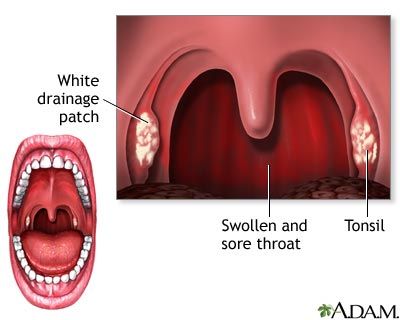Tonsillitis is inflammation (swelling) of the tonsils.
Causes
The tonsils are lymph nodes in the back of the mouth and top of the throat. They help to filter out bacteria and other germs to prevent infection in the body.
A bacterial or viral infection can cause tonsillitis. Strep throat is a common cause.

The infection may also be seen in other parts of the throat. One such infection is called pharyngitis.
Tonsillitis is very common in children.
Symptoms
Common symptoms may be:
- Difficulty swallowing
- Ear pain
- Fever and chills
- Headache
- Sore throat, which lasts longer than 48 hours and may be severe
- Tenderness of the jaw and throat
Other problems or symptoms that may occur are:
- Problems breathing, if the tonsils are very large
- Problems eating or drinking
Exams and Tests
Your health care provider will look in the mouth and throat.
- The tonsils may be red and may have white spots on them.
- The lymph nodes in the jaw and neck may be swollen and tender to the touch.
A rapid strep test can be done in most providers' offices. However, this test may be normal, and you can still have strep. Your provider may send the throat swab to a laboratory for a strep culture. Culture results can take a few days.
Treatment
Swollen tonsils that are not painful or do not cause other problems do not need to be treated. Your provider may not give you an antibiotic. You may be asked to come back for a checkup later to assess your progress.
If tests show you do have strep, your provider will give you an antibiotic. It is important to finish all of your antibiotic doses as directed, even if you feel better. If you do not take them all, the infection can return.
The following tips may help your throat feel better:
- Drink cold liquids or suck on fruit-flavored frozen bars.
- Drink fluids, and mostly warm (not hot), bland fluids.
- Gargle with warm salt water.
- Suck on lozenges (containing benzocaine or similar ingredients) to reduce pain (these should not be used in young children because of the choking risk).
- Take over-the-counter (OTC) medicines, such as acetaminophen (Tylenol) or ibuprofen to reduce pain and fever. DO NOT give a child aspirin. Aspirin has been linked to Reye syndrome in children.
Some people who have repeated infections may need surgery to remove the tonsils (tonsillectomy).
Outlook (Prognosis)
Tonsillitis symptoms due to strep will often get better within 2 or 3 days after you start the antibiotics.
Children with strep throat should be kept home from school or day care until they have been on antibiotics for 24 hours. This helps reduce the spread of illness.
Possible Complications
Complications from strep throat may be severe. They may include:
- Abscess in the area around the tonsils
- Kidney disease caused by strep
- Rheumatic fever and other heart problems
When to Contact a Medical Professional
Contact your provider if there is:
- Excess drooling in a young child
- Fever, particularly 101°F (38.3°C) or higher
- Pus in the back of the throat
- Red rash that feels rough, and increased redness in the skin folds
- Severe problems swallowing or breathing
- Tender or swollen lymph glands in the neck
Alternative Names
Sore throat - tonsillitis
Patient Instructions
References
Chi DH, Tobey A. Otolaryngology. In: Zitelli BJ, McIntire SC, Nowalk AJ, Garrison J, eds. Zitelli and Davis' Atlas of Pediatric Physical Diagnosis. 8th ed. Philadelphia, PA: Elsevier; 2023:chap 24.
Mitchell RB, Archer SM, Ishman SL, et al. Clinical practice guideline: tonsillectomy in children (update) - executive summary. Otolaryngol Head Neck Surg. 2019;160(2):187-205. PMID: 30921525 pubmed.ncbi.nlm.nih.gov/30921525/.
Zur KB. Tonsils and adenoids. In: Kliegman RM, St. Geme JW, Blum NJ, et al, eds. Nelson Textbook of Pediatrics. 22nd ed. Philadelphia, PA: Elsevier; 2025:chap 431.
Review Date 10/20/2024
Updated by: Neil K. Kaneshiro, MD, MHA, Clinical Professor of Pediatrics, University of Washington School of Medicine, Seattle, WA. Also reviewed by David C. Dugdale, MD, Medical Director, Brenda Conaway, Editorial Director, and the A.D.A.M. Editorial team.





